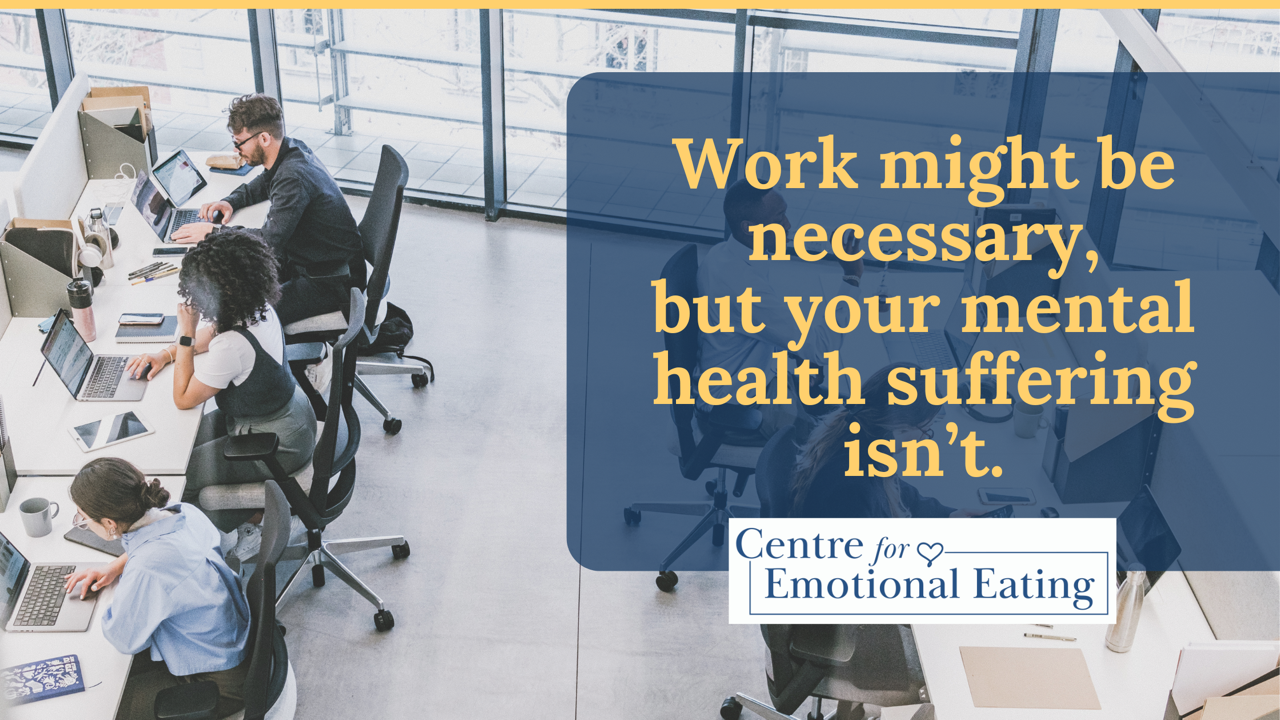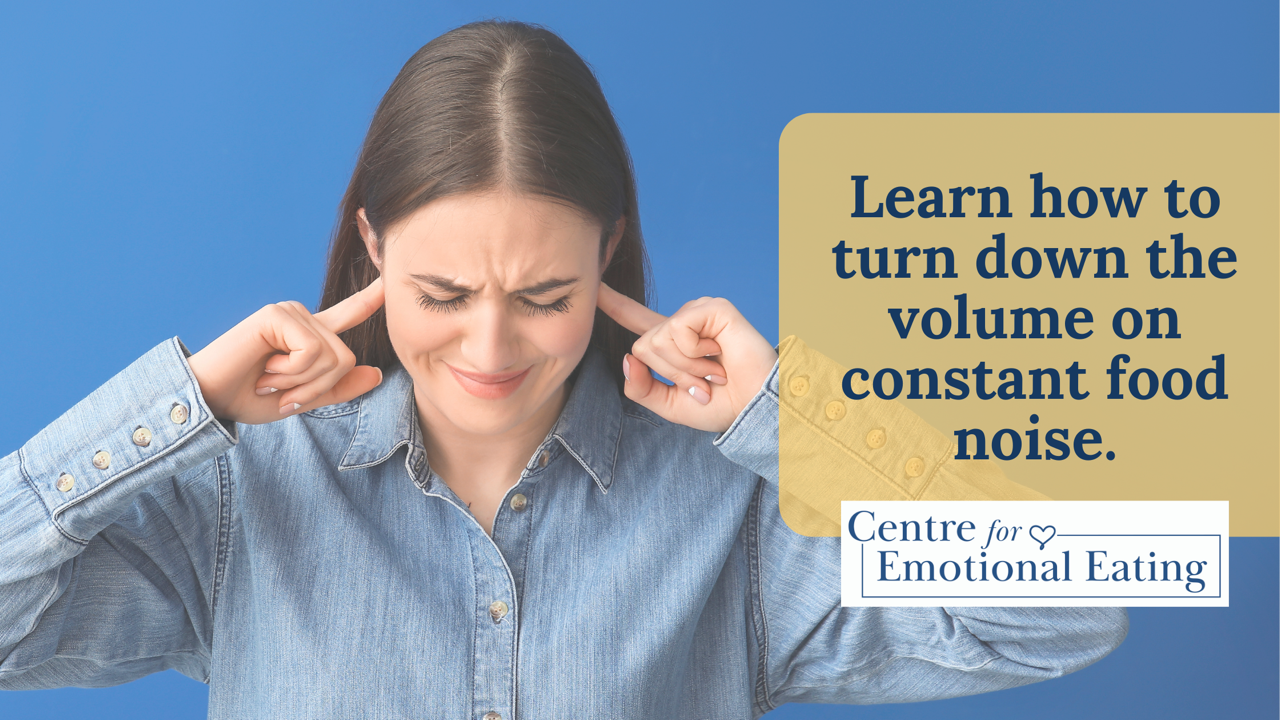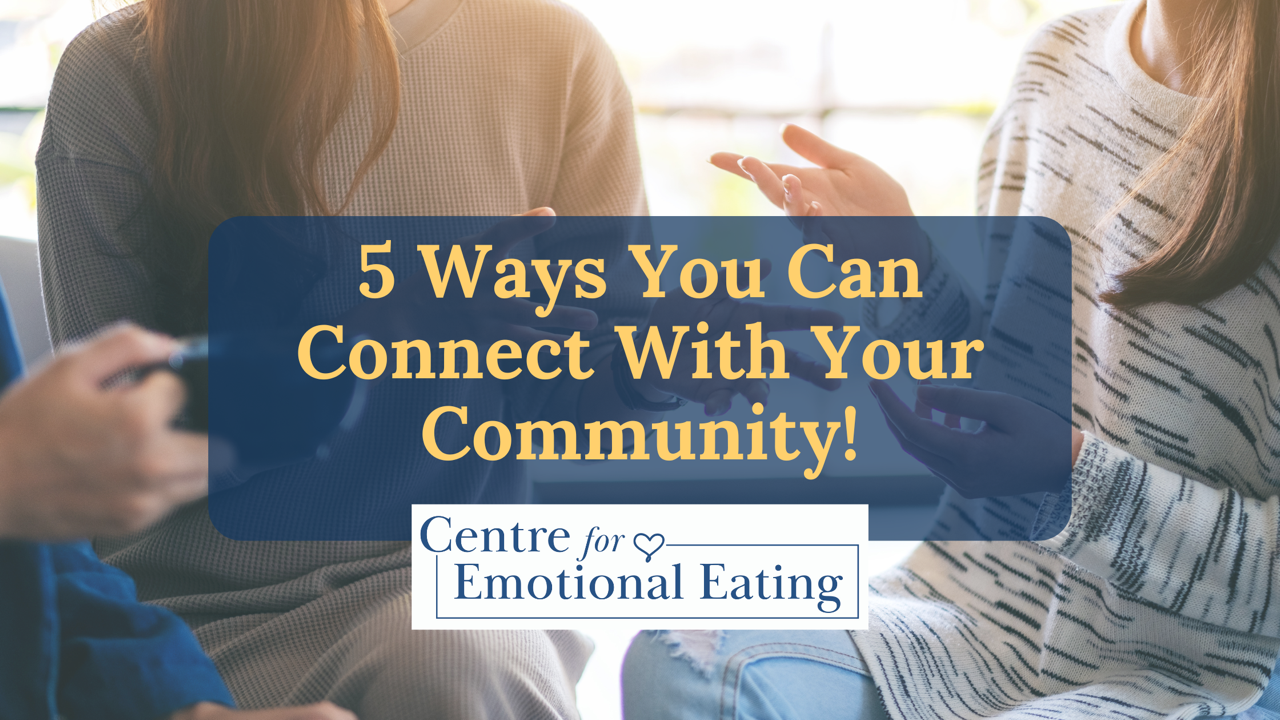BLOG
Find support not just for emotional eating, but all aspects of your well-being.
Supporting Your Mental Health at Work

No matter what you do for work, chances are it is a stressor in your life. Even if you enjoy your job, there might be tasks or colleagues you’d rather not deal with. Work is a necessity not just for income, but also purpose, goal setting, community, and future planning.
That doesn’t mean it isn’t stressful.
Below are a number of ways you can support your mental health as a worker.
Basic Maintenance Goes a Long Way
You might already know that routines, rituals, and structure can support your well-being, so focusing on identifying working hours (and rest or play hours), practicing good sleep hygiene, and implementing boundaries around your work phone or logging in can be incredibly helpful for supporting your mental health. It can also be helpful to create a transition ritual where you let your nervous system know that you are changing from work you to home you. Listen to a meditation app on your commute or change clothes as soon as you are home. These can signal to your body that it...
Why You Dread Being Bored

Our modern society keeps us hustling: from work to parenting to errands to all kinds of activities. We’re taught that there is value in keeping busy, that being productive should be celebrated. We also are constantly bombarded online with content that highlights people having it all together, going on their next vacation, workout out at 5:00 a.m., or getting a promotion. You feel you have to keep doing to keep up!
And being busy can be a coping mechanism too.
There are a number of reasons you might keep adding to your to do list. First, keeping your mind constantly focused on what you have to do next stops you from having any space to think. It becomes an avoidance tactic that keeps you from feeling or thinking about what you don’t want to. Ever notice when the chaos of the day ends—driving home from work or after the kids are in bed—you end up reaching for food? That’s because constantly being busy is an avoidance tactic just like emotional eating. You can rely on food when your day...
Food Noise Explained: Why It Happens and How to Find Peace with It

It is common to think about food: what you have to pick up at the grocery store, your weekend dinner out with friends, or even if you want a pastry to go with your coffee.
But when your mind is running a constant dialogue focused on your next meal or snack, how much and when you’ll eat, chances are you’re experiencing food noise. You might have come across this term online, so today we’re breaking down why you can’t stop thinking about food and what to do about it.
What is food noise?
We can define it as a preoccupation with food before, during, and after you eat—so all the time! This can come in the form of questions or criticisms. Do any of these sound familiar?
- “I just ate but I’m still hungry. I shouldn’t eat any more, but I kind of want more potatoes, they were so creamy, probably full of butter…”
- “I have ice cream in the freezer. I shouldn’t eat it. I want it. I’m going to eat it. That was so good, what more can I have? I’ve already had the ice cream, I’ve blown it, I’ll j ...
Retrain Your Brain: Finding Happiness Outside of Food

There are many reasons people emotionally eat: to distract themselves, to feel numb, to have something to control. But one of the common reasons I hear from clients is that food brings them a sense of happiness that they feel doesn’t compare to any other experience currently in their life. This makes emotional eating incredibly difficult to stop relying on when you don’t have others ways of accessing this feel-good emotion. Does any of this sound familiar?
- A snack feels like an only acceptable break from grinding away at work or your to do list. Your brain makes the connection that not working = food.
- You only feel your body relax once the kids are in bed and you can eat alone in the evening. The connection your brain makes here is alone time = food time.
- You only allow yourself to have foods like cake or popcorn at events like parties or at the movie theatre. Here your brain connects special events (happy times) and specific foods.Our brains love to work on auto-pilot because it ...
How Mindfulness Can Help with Emotional Eating

From easy-to-use apps to therapy practices, mindfulness seems to be an ever-present technique for managing our fast-paced world. But is it more than just a buzzword? Research shows that being more mindful can reduce stress and anxiety, alleviate depression, support your physical health, and more!
In today’s blog post, we’re breaking down just how you can implement this powerful tool into your life with just a few minutes at a time.
What is mindfulness?
Mindfulness is bringing awareness to the present moment. This looks like tapping into what your body is feeling, what thoughts or feelings are floating to the surface, and what you can see and feel (like the sunshine on your face). That might sound intimidating—especially if you’re someone who eats to avoid intense emotions—but acknowledging sensations, smells, and in the present moment means you can let go of anxiety of the future or grief over the past.
How can it help me with my emotional eating?
Emotional eaters often reach for ...
Tapping into the Power of Community (For extroverts AND introverts!)

The restrictions from the pandemic has left many looking for a renewed sense of connection. Online get togethers got us through social distancing, but there seems to be a growing desire to meet up again in person.
You might be reading that and thinking “Not me! I thrived with more alone time”, and while that might be true (we all need opportunities to recharge) even introverts need a community they can tap into just as much as extroverts!
We’ve written before about how creating connection can help with feelings of loneliness (a major trigger for emotional eating), but getting a feeling of connection doesn’t have to mean a filled-to-the-brim calendar of social events. It is true that you can have a small circle of friends that you feel close to or be surrounded by many people and feel lonely. Connecting with others isn’t about the number of people you interact with or events you attend, it’s how it makes you feel! So, here are some ideas for you to try out in your own life to create c...
5 Reasons Why You Emotionally Eat at Night (And what to do about it)

We recently asked our followers what time of day they feel is the worst for their emotional eating. And an overwhelming number of you said night time. Know that you are not alone! It is incredibly common to have the evenings be a time where emotional or binge eating ramps up. And there are very good reasons why you overeat late at night, and none of them are because you’re “crazy” or “lack willpower.” Here are 5 common reasons emotional eating comes up at night and what you can do to address each one.
You ate how you “should” during the day. Restricting what and how much you eat throughout the day will ultimately lead to binge eating (even if you are trying to “reset” from your last binge!). Not only is your body asking for more food, it is asking for food that is pleasurable. At the end of the day, you’re left feeling hungry and unfulfilled.
- Solution: No matter what you ate the night before, start the next day off with a clean slate: have foods you enjoy all day or earlier in the ...
The Solution to Eating out of Loneliness? Connection!

You might think of emotional eating as something that comes up for you when you have strong feelings like anger, stress, or sadness. These are emotions that are usually easy to identify by your inner dialogue or your outward reactions like tears or yelling. But emotional eating can sneak in with all kinds of feelings.
Ones you may not have thought about is eating when you’re bored or lonely. These reasons for overeating can be challenging to identify because we often do them without any sense of awareness. You’re not feeling overly emotional and yet you find yourself walking the same route to the fridge or pantry thinking it is simply routine.
When you’re bored or lonely, food as a solution to missing a connection makes sense. Your favorite treats feel comforting, plus they are easily available—it never lets you down or doesn’t show up (like you might be feeling about people).
The first thing to do is to find out what kind of connection you’re looking for: is it a social connection ...
3 Good Things That Can Come from a Binge

Binge eating feels all encompassing. You feel helpless to stop what and how much you are going to eat, and chances are you are doing it in the moments where you are alone. Here are three signs you may have missed during a binge and how to feel better prepared the next time this urge comes up for you:
- That moment when you decide to give into a binge, even when you know it won’t make you feel good in the long run, is actually a good sign. Even if you continue with the binge, you’ve made a mental note that there is an ‘after’ to the binge. We are absolutely not applauding the guilt and shame that comes post-binge but knowing that you are going to get through the binge is the beginning to being able to think beyond it—showing you’re not so afraid of what life might send your way next!
- What do to next: tell yourself, out loud even, that “I am going to get through this.” Speaking to yourself in this way creates a kind of pep talk that can allow some positivity (and even empowerment) co ...
Not All Emotional Eaters are Overweight

When TV shows and media show us what an emotional eater looks like, it is usually someone who would be categorized as obese by the BMI chart. Their rolls and double chin are highlighted to create a character that seems lazy or is the punchline in a few jokes. Not only is this incredibly harmful messaging to those in bigger bodies, it also isn’t indicative of the experience of all emotional eaters.
But there is no one body type for emotional eaters, it can affect anyone.
They could identify as male or female.
They could be a preteen or a person in their 50s.
They could be from any cultural background.
They could reach for savoury or sweet foods when an emotion comes up.
What they do all have in common is that is that they eat to sooth themselves. When a feeling comes up that they can’t manage or don’t want to feel, they reach for food as a distraction, to numb out, even to bring some control or joy to the moment.
While from a caloric perspective, it is true that eating more than ...


